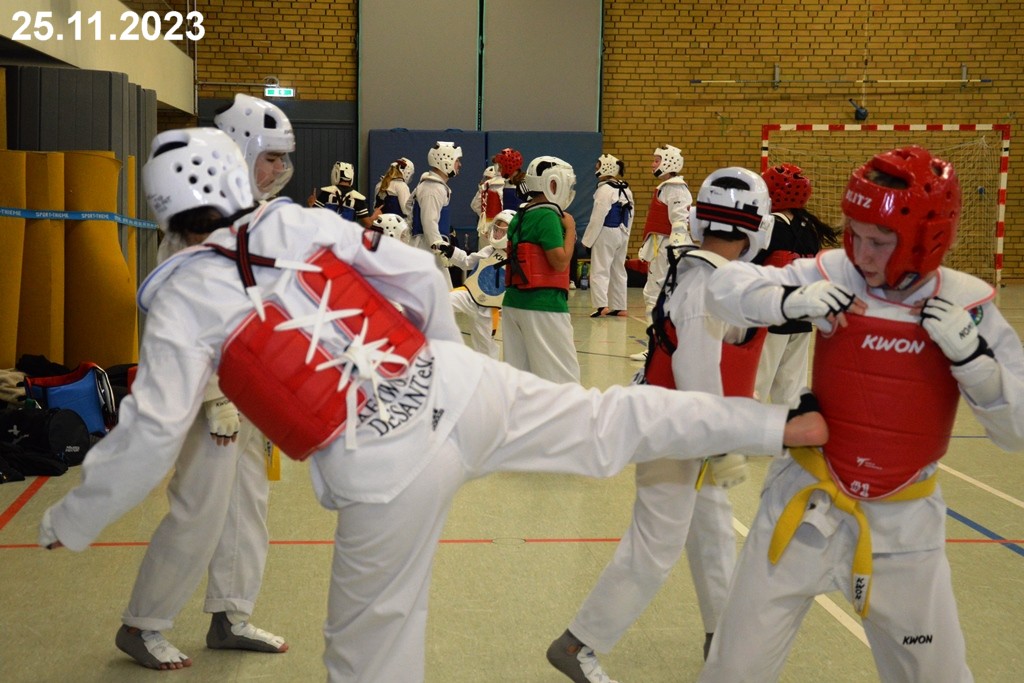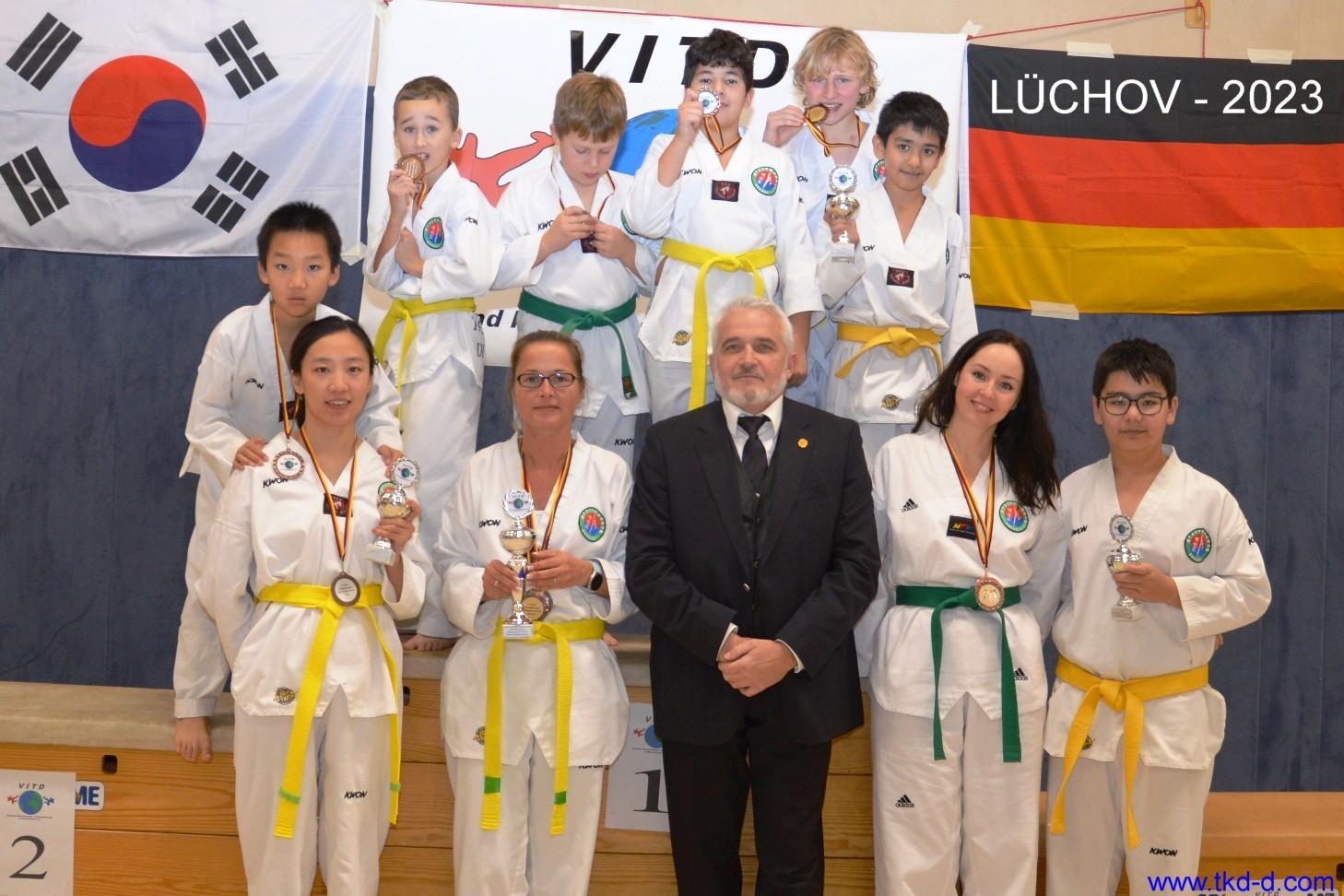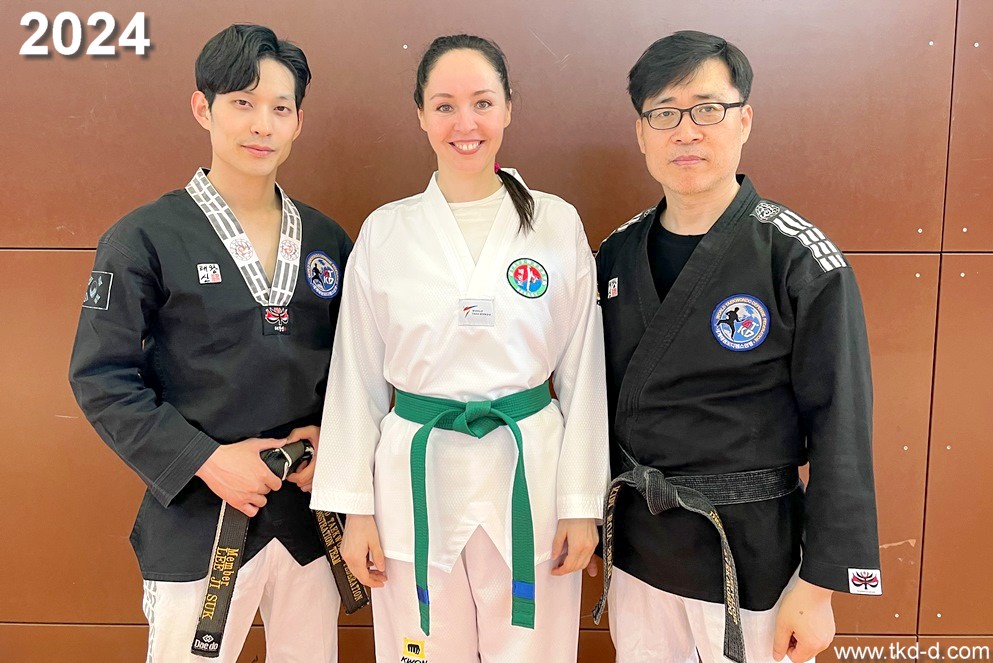STATEMENT
§1 Name, registered office and financial year.
2a.Non-profit status of the association.
2b.Charitable purposes of the association.
§3 Membership.
§3 Rights and obligations of members.
§4 Beginning/end of membership.
§5 Membership fees.
§6 Boards of the association.
§7 General Meeting / Convocation.
§8 Voting rights / quorum.
§9 Board of Directors.
§10 Appointment of honorary members of the association
§11. Annual cash report and cash audit of the association
§12 Regulations of the association
§13 Publication of photos and texts on the Internet / Facebook
§14 Dissolution of the association
§15 Entry into force
§1 Name, registered office and financial year.
The name of the association is Taekwondo Desant e.V. (hereinafter referred to as "Taekwondo Verein") The association TAEKWONDO Desant e.V. has its registered office in 31535 Neustadt am Rbge, Am Kuhlager 28 and is entered in the register of associations at Hanover Local Court. The financial year is the calendar year. The Taekwondo Desant e.V. association has a club symbol. The club symbol is used as a badge in letters and as a club logo in documents.
The symbol represents:

it is represented as a circle the center circle represents Ying and Yang in red and blue in the center circle is a Taekwondo fighter performing a Jop-Chagi, in red protective equipment; to the left of it is "Taekwondo" in Korean lettering; the center circle in green contains the name of the association "Taekwondo Desant e.V." with a white fist to the left and right of an outer circle in black;
The club has its own stamp (round and 38 mm in diameter; round and 20 mm in diameter) which corresponds to the symbol of the club. The stamp is only in the possession of the first chairman of the board and the secretary (recording secretary) in order to stamp sports certificates (e.g. sports pass). Coaches must have their own stamp with their surname, first name and club name.
§2a. Non-profit status of the association.
2a.1 The Taekwondo Desant e.V. association pursues exclusively and directly charitable purposes within the meaning of the section "Tax-privileged purposes" of the German Tax Code. The Taekwondo Desant e.V. association is selflessly active; it does not primarily pursue its own economic purposes.
2a.2 The Taekwondo Desant e.V. association is ethnically and denominationally neutral and does not pursue any political purposes.
2a.3 The association's funds may only be used for the purposes set out in the statutes. The members of Taekwondo Desant e.V. shall not receive any profit shares or, in their capacity as members, any other benefits from the association's funds.
2a.4 No person may benefit from expenses that are alien to the purpose of the association or from disproportionately high remuneration.
2a.5 Appropriate funds shall be used for the fulfillment of these statutory purposes through contributions / levies, donations and other contributions.
§2b. Charitable purposes of the association.
The Taekwondo Desant e.V. association pursues the following objectives:
2b.1. The purpose of the association is the promotion of sport, in particular of Taekwondo as an Olympic sport and related martial arts.
2b.2. Exchange of information and popularisation of Taekwondo among former and active athletes, through training, meetings and events events in which underage participants may also take part. Are allowed to participate.
2b.3 The association supports its members in participating in sports events/training/competitions.
2b.4. to cooperate with various sports clubs.
2b.5. promotion ofof rural studies and sport among underage members by organising sports events / training / hikes / campfire meetings and competitions campfire meetings and competitions/competitions.
2b.6. The purpose of the statutes is realised in particular by holding regular training sessions under the guidance of specialised trainers and trainers and instructors, as well as the participation in and organisation of and the organisation of martial arts events, competitions and tournaments. tournaments.
§3 Membership.
Any natural or legal person can become a member. The association consists of active members, but can also accept supporting members (ordinary members) and honorary members. Active members are members who are directly involved in the Association; supporting members and honorary members are members who are not actively involved in the Association but who promote and support the objectives and purpose of the Association in an appropriate manner. A natural person who is not a member of the association can also become an honorary member. Membership (admission/exclusion) is decided solely by the Association's Board of Directors. A trial period / probationary period for membership can be set for each candidate for membership. The membership application of minors requires the signatures of their legal representatives. The applicant may appeal to the General Meeting against a rejection of the application for membership by the Executive Board, which does not require any justification. This shall make the final decision. Each member receives a membership card / sports pass with photo after a probationary period (determined individually for each member by the Executive Board). There are separate regulations governing the sports pass / membership card. (Membership card regulations).
§4 Rights and obligations of members.
Members are entitled to participate in all events organised by the Taekwondo Association. They also have the right to submit motions to the Executive Board and the General Meeting. The right to vote can only be exercised in person at the general meeting. Members are obliged to support the association and its purpose in a proper manner. Members are obliged to pay membership fees. Members are not insured for any events organised by the association. The association itself is not obliged to take out insurance. Every member of the association is obliged to take out their own insurance (e.g. liability, accident cover, etc.).
§5 Start/end of membership.
Membership must be applied for in writing to the Executive Board.
The Executive Board shall make a final decision on the written application for membership by a simple majority of votes. The Executive Board is not obliged to inform the applicant of the reasons for rejection. Membership changes (from active membership to supporting membership) must be notified to the Executive Board in writing at least three months before the end of the financial year. Membership ends through voluntary resignation, expulsion, death of the member or loss of legal capacity in the case of legal entities. Voluntary termination of membership must be declared to the Executive Board by giving three months' written notice to the end of the financial year. The exclusion of a member with immediate effect and for good cause can be pronounced if the member grossly violates the articles of association, regulations, the purpose of the articles of association or the interests of the association. The Executive Board decides on the expulsion of a member by a simple majority of votes. The member must be given the opportunity to comment on the allegations made within two weeks prior to expulsion. Upon termination of membership, for whatever reason, all claims arising from the membership relationship shall lapse. A refund of contributions, donations or other support payments is generally excluded. This shall not affect the Association's entitlement to outstanding contributions.
§6 Membership fees.
Members are required to pay membership fees. The amount of the annual membership fees, admission fees and levies shall be determined by the applicable membership fee regulations, which shall be adopted by the General Meeting. The membership fee regulations are not part of the articles of association. Honorary members are exempt from the obligation to pay contributions. Members are only liable for legal transactions carried out by the Executive Board on behalf of the association with the association's assets.
§7 Organs of the Association.
The bodies of the Association are
7.1. the General Meeting
7.2. the Executive Board.
8.1 The supreme body of the Association is the General Meeting, which has the following tasks in particular:
- To receive and discuss the annual reports,
- To render accounts for the past financial year,
- to approve the actions of the Executive Board,
- (in the election year) to elect the Executive Board,
- to decide on the Articles of Association, amendments to the Articles of Association and the dissolution of the Association.
8.2 An ordinary general meeting shall be convened by the Executive Board of the Association as required, but at least once per financial year, if possible in the second half of the financial year. The invitation shall be sent in writing or via the Internet by the Executive Board at least 14 days in advance, with notification of the provisionally set agenda to the member address or e-mail address last known to the Association.
8.4 Proposals from members regarding the agenda must be submitted in writing to the Executive Board of the Association at least two weeks before the General Meeting. Subsequently submitted agenda items must be communicated to the members in good time before the start of the General Meeting. Subsequent proposals - including those submitted during the Annual General Meeting - must be placed on the agenda if the majority of voting members present at the Annual General Meeting agree to the proposals being dealt with (urgent proposals).
8.5 The Executive Board must immediately convene an extraordinary General Meeting if the interests of the Association so require or if at least one third of the voting members of the Association so request in writing, stating the purpose and reasons.
§9 Voting rights / quorum.
9.1 All active members and all ordinary members and honorary members are entitled to vote. Every member who has reached the age of 16 has one vote, which may only be exercised in person. Members who are not entitled to vote may attend the General Meeting as guests, after consultation with the Executive Board of the Association.
9.2 The General Meeting shall constitute a quorum regardless of the number of members present.
9.3 The General Meeting passes its resolutions by simple majority. Abstentions are not taken into account. In the event of a tied vote, the motion put forward is deemed to have been rejected.
9.4 Votes at the General Meeting are taken openly by show of hands or by acclamation.
9.5 Amendments to the Articles of Association and resolutions to dissolve the Association require a two-thirds majority of those present and entitled to vote.
10.1 The Executive Board is composed as follows:
First Chairman;
second chairman (deputy);
the cashier
the youth leader
Secretary
They are elected by the general meeting for a term of 5 years. The unlimited re-election of board members is permitted. After the expiry of the term, the board members remain in office until their successors take office.
10.2 The board is responsible for managing the work of the association. It can adopt rules of procedure and can distribute special tasks among its members or set up committees to work on or prepare them. Only the board can present members for awards or rewards and award them.
10.5 Resolutions of the Executive Board shall be recorded in minutes of the meeting and signed by at least two members of the Executive Board authorised to represent the company.
10.6 If a member of the Executive Board resigns before the end of his/her term of office, the Executive Board is authorised to appoint an acting member of the Executive Board.
Board members appointed in this way shall remain in office until the next General Meeting. The members of the Executive Board are only liable for legal transactions carried out by the Executive Board with the assets of the association.
Persons who have rendered outstanding services to the Association may be appointed honorary members on the recommendation of the Executive Board. The appointment of honorary members is for life. It requires a majority of 2/3 of the members present.
12.1 The General Meeting shall select two persons to audit the accounts for a period of one year. These persons may not be members of the Executive Board or a committee appointed by it. Re-election is permitted.
12.2 The cash auditors must audit the Association's accounts, including the books and receipts, at least once per financial year and submit a written report to the Executive Board. The cash auditors shall submit an audit report to the General Assembly and, if the cash transactions have been conducted properly, request that the actions of the treasurer and the other members of the Executive Board be approved.
In order to implement the Articles of Association, the Executive Board must issue rules of procedure, financial regulations and regulations for the use of sports facilities. The regulations shall be adopted by a majority of 2/3 of the members of the Executive Board. The Executive Board may also issue further regulations.
The photographs and texts of association members may be published in connection with the homepage / Facebook. There is and shall be no liability claim against the Executive Board of the association for the type and form of use of the homepage/Facebook, for example for the downloading of images and their subsequent use by third parties. All members of the association are advised that the photos can be accessed worldwide when published on the Internet. Further use of these photos by third parties can therefore not generally be ruled out. According to § 22 KUG (Art Copyright Act), publication is generally only permitted if the consent of those depicted has been obtained in advance. However, according to § 23 KUG, consent is not required if the persons depicted are not the main focus of the motif or if they are "persons of contemporary history" or part of a gathering/event.
15.1 If the association is dissolved or if tax-privileged purposes cease to exist, the assets of the association shall be transferred to a legal entity under public law or another tax-privileged corporation for the purpose of promoting sport.
15.2 The members of the Executive Board who are in office and authorised to represent the Association shall be appointed as liquidators, unless the General Assembly decides otherwise.
16.1 These Articles of Association were adopted in their present form by the General Meeting of the Association on 21 June 2024.
Source: http://tkd.desantura.de/en/about-us/statemtkdd.html












